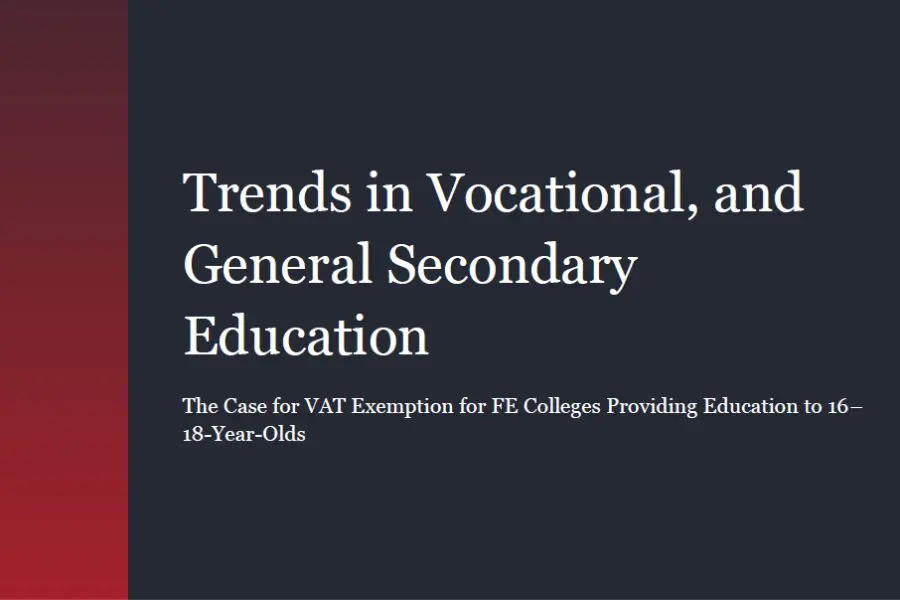


Funding Futures: new report calls for VAT reform to unlock investment in Further Education

A new report by the London School of Economics (LSE) and seven leading college groups is calling for urgent VAT reform to unlock investment in skills, opportunity and growth across Further Education (FE).
In the UK today, FE colleges educate more 16–18 year olds than school sixth forms, with 693,000 students currently enrolled. These students are more likely to come from disadvantaged backgrounds, making colleges central to the government’s mission to improve opportunity and drive economic growth.
Despite their public sector status, colleges cannot reclaim VAT on most education-related purchases, unlike schools and academies. This creates a funding gap that effectively values a college student 20% less than their school counterpart. The Association of Colleges estimates this costs the sector £250 million annually, funds that could be reinvested in students, staff and facilities.
A report was commissioned by seven large college groups including Capital City College, New City College, LTE Group, Activate Learning, Chichester College Group, Luminate Education Group and NCG to examine the financial and operational impact of the current VAT regime on FE colleges. With research conducted by academics from LSE, the report concludes that aligning VAT arrangements with schools would be fiscally neutral for the Treasury, while unlocking millions of pounds for reinvestment in skills, technology and community growth.
Report launch at LSE
The report, “Trends in Vocational, and General Secondary Education: The Case for VAT Exemption for FE Colleges Providing Education to 16-18-Year-Olds”, was launched on Tuesday 4 November at the London School of Economics. The event brought together sector leaders, economists and policymakers.
Robert Peston, award winning political editor, journalist, author and founder of Speakers for Schools, delivered the keynote address and spoke about the current economic context and challenges, and how further education and skills are an absolutely key part of the solution:
“The single most important task for the government is to increase growth, productivity and living standards. Further education colleges can be such an important contributor. Ministers rightly highlight the scandal of a million young people not in education, employment or training. And when I talk to employers they tell me there are not enough people in this country with the skills that they need. Further education colleges should be front and centre in resolving these.”
“It matters that the future of further education is a confident future. The country depends on it. You deserve the nation’s support. You need proper resources.”
Why VAT reform matters
- Half of all 16–18 year olds in England are educated in colleges
- Almost a quarter of college students were eligible for free school meals at age 15, compared to 13% in schools
- VAT Reform would be fiscally neutral and release vital resources for reinvestment in facilities, staffing and student support
Lost potential: what colleges could do with VAT Reform
- Capital City College could have invested £1.6 million in industry-standard digital equipment
- LTE Group could create 400 additional student places or close the pay gap between college and school teachers
- New City College could have built three new science labs instead of paying £800,000 in VAT on a single teaching block
A call for reform
The report sets out a clear case: VAT reform for FE is fair, economically sound and fiscally neutral. Aligning colleges with schools would:
- Remove an unfair financial burden on the FE sector
- Strengthen colleges’ capacity to deliver the Government’s skills agenda
- Improve regional growth, social mobility and productivity
- Demonstrate a genuine commitment to equitable public funding in education
Angela Joyce, Chief Executive Officer of Capital City College, said:
“Further education is a powerful vehicle to address social inequalities and support economic growth. The financial pressures facing colleges must be addressed with a longer-term change in policy to provide better financial stability and enable sustainable investment in resources for students. The ability to reclaim VAT like other public bodies is a forward-thinking route for the Government to demonstrate that those studying technical and vocational qualifications are valued the same as those studying A levels in schools.”
King’s Cross
London
WC1X 8RA
United Kingdom Contact Us




